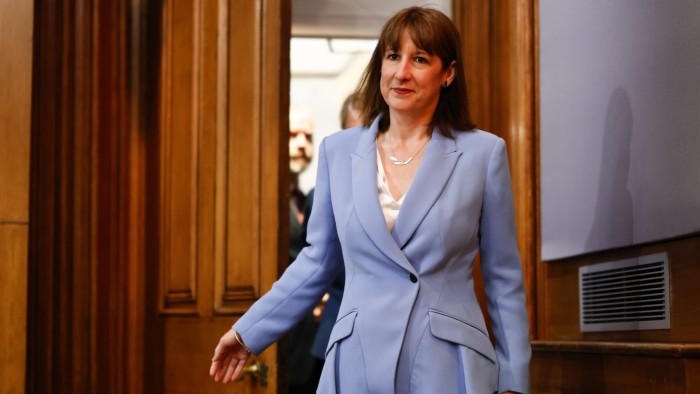Unlock the Editor’s Digest for free
Roula Khalaf, Editor of the FT, selects her favourite stories in this weekly newsletter.
Rachel Reeves will struggle to convince the UK’s fiscal watchdog that recent government moves can noticeably improve growth to help fill a hole in the public finances worth tens of billions of pounds, economists have warned.
The chancellor said on Friday that she wanted the Office for Budget Responsibility (OBR) to give the government credit for policies such as a mooted youth mobility scheme with the EU so she could mitigate the need for fresh tax increases in the Budget on November 26.
But the terms of the UK’s “reset” with the EU are still under negotiation, making it harder for officials to quantify the effects.
And while Labour wants the watchdog to recognise potential growth from trade agreements with major partners, the overall outlook has darkened since the OBR’s March forecast, given US President Donald Trump’s “liberation day” tariffs.
Andrew Goodwin, chief UK economist at consultancy Oxford Economics, said the chancellor was trying to “build a narrative” on pro-growth measures, but they would not prevent a big downgrade in the OBR’s outlook. He expects weaker growth to create a fiscal hole of £25bn-£30bn in the OBR’s October forecast.
Andy King, a former top official at the OBR, said the measures he had seen to date seemed economically “modest”, although the full details would need to be laid out before a proper assessment.
The Financial Times reported two weeks ago that officials were braced for a fiscal gap of up to £30bn in the OBR’s first private forecast for the Treasury. The biggest driver was expected to be a reduction in the OBR’s relatively bullish trend productivity growth forecast, which has been criticised by economists including Andrew Bailey, the governor of the Bank of England.
“Overall the OBR is unlikely to still want to be the most optimistic forecaster out there and that is the thing they are battling against,” Goodwin said. “Any tinkering around on individual policies is by the by.”
A youth mobility scheme allowing more EU nationals to work in Britain on time- and quota-limited visas would have only a small impact on the outlook for overall net migration, given ministers’ insistence that Britain will not bring back free movement.
In the March forecast, the OBR already expected net migration to fall sharply from about 728,000 in the year to mid-2024 to 258,000 in the year to mid-2027 as a result of recently introduced restrictions. It would reach 340,000 at the forecast horizon.
Since then, the government has announced a further clampdown on immigration through almost all channels, including work-related visa routes. It estimates these measures, set out in a white paper in May, will cut net migration by about 100,000 a year.
Jonathan Portes, an economics professor at King’s College London, said that given the white paper’s policies, the OBR’s March forecasts for net migration now looked “very optimistic”.
A fall in annual net migration of 100,000 could add about £7bn a year to the deficit by the end of the forecast period, he said.
Previous analysis by John Springford, associate fellow at the Centre for European Reform, suggested that an EU mobility scheme could be one of the more significant elements of a UK-EU “reset”, but only if it was an “expansive” scheme of the kind Brussels had pushed for.
Without any quota, an EU mobility deal was likely to boost GDP by up to 0.45 per cent over 10 years, if young Europeans came to the UK at the rate seen in 2015-19, he estimated. If take-up was at a much lower rate, it would add just 0.04 per cent to GDP over the decade.
Changes in the run rate of net migration are an important element of the OBR’s forecasts because they affect the outlook for labour supply and the UK’s long-term growth prospects. A bigger workforce boosts the OBR’s forecasts for revenues, but does not change its forecasts for public spending, despite arrivals’ likely use of public services, because these are based on published government plans.
UK government analysis of a trade deal with India struck over the summer suggests a long-term increase in GDP of just 0.13 per cent. Meanwhile, Trump’s tariff increases have led to a global trade shock, even if the UK negotiated less onerous terms than other partners.
King, a former member of the OBR’s steering committee who is now at consultancy Flint Global, said the OBR would assess pro-growth measures “on their merits”, but that it would want to see the detailed terms of something like a youth mobility deal with the EU before quantifying the economic effects.
The chancellor’s spring fiscal statement gave her headroom of £9.9bn against her key fiscal rule, which requires her to fund all spending, excluding investment, entirely with tax revenues by the end of the parliament.




